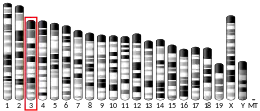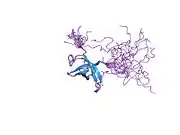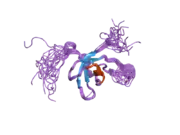| CSDE1 | |||||||||||||||||||||||||||||||||||||||||||||||||||
|---|---|---|---|---|---|---|---|---|---|---|---|---|---|---|---|---|---|---|---|---|---|---|---|---|---|---|---|---|---|---|---|---|---|---|---|---|---|---|---|---|---|---|---|---|---|---|---|---|---|---|---|
 | |||||||||||||||||||||||||||||||||||||||||||||||||||
| |||||||||||||||||||||||||||||||||||||||||||||||||||
| Identifiers | |||||||||||||||||||||||||||||||||||||||||||||||||||
| Aliases | CSDE1, D1S155E, UNR, cold shock domain containing E1 | ||||||||||||||||||||||||||||||||||||||||||||||||||
| External IDs | OMIM: 191510 MGI: 92356 HomoloGene: 5179 GeneCards: CSDE1 | ||||||||||||||||||||||||||||||||||||||||||||||||||
| |||||||||||||||||||||||||||||||||||||||||||||||||||
| |||||||||||||||||||||||||||||||||||||||||||||||||||
| |||||||||||||||||||||||||||||||||||||||||||||||||||
| |||||||||||||||||||||||||||||||||||||||||||||||||||
| |||||||||||||||||||||||||||||||||||||||||||||||||||
| Wikidata | |||||||||||||||||||||||||||||||||||||||||||||||||||
| |||||||||||||||||||||||||||||||||||||||||||||||||||
Cold shock domain-containing protein E1 is a protein that in humans is encoded by the CSDE1 gene.[5][6][7]
References
- 1 2 3 GRCh38: Ensembl release 89: ENSG00000009307 - Ensembl, May 2017
- 1 2 3 GRCm38: Ensembl release 89: ENSMUSG00000068823 - Ensembl, May 2017
- ↑ "Human PubMed Reference:". National Center for Biotechnology Information, U.S. National Library of Medicine.
- ↑ "Mouse PubMed Reference:". National Center for Biotechnology Information, U.S. National Library of Medicine.
- ↑ Jeffers M, Paciucci R, Pellicer A (Oct 1990). "Characterization of unr; a gene closely linked to N-ras". Nucleic Acids Res. 18 (16): 4891–9. PMC 331975. PMID 2204029.
- ↑ Nagase T, Ishikawa K, Suyama M, Kikuno R, Hirosawa M, Miyajima N, Tanaka A, Kotani H, Nomura N, Ohara O (May 1999). "Prediction of the coding sequences of unidentified human genes. XII. The complete sequences of 100 new cDNA clones from brain which code for large proteins in vitro". DNA Res. 5 (6): 355–64. doi:10.1093/dnares/5.6.355. PMID 10048485.
- ↑ "Entrez Gene: CSDE1 cold shock domain containing E1, RNA-binding".
External links
- Human CSDE1 genome location and CSDE1 gene details page in the UCSC Genome Browser.
Further reading
- Nicolaiew N, Triqueneaux G, Dautry F (1991). "Organization of the human N-ras locus: characterization of a gene located immediately upstream of N-ras". Oncogene. 6 (5): 721–30. PMID 2052355.
- Boussadia O, Jacquemin-Sablon H, Dautry F (1993). "Exon skipping in the expression of the gene immediately upstream of N-ras (unr/NRU)". Biochim. Biophys. Acta. 1172 (1–2): 64–72. doi:10.1016/0167-4781(93)90270-N. PMID 8439573.
- Andersson B, Wentland MA, Ricafrente JY, et al. (1996). "A "double adaptor" method for improved shotgun library construction". Anal. Biochem. 236 (1): 107–13. doi:10.1006/abio.1996.0138. PMID 8619474.
- Yu W, Andersson B, Worley KC, et al. (1997). "Large-Scale Concatenation cDNA Sequencing". Genome Res. 7 (4): 353–8. doi:10.1101/gr.7.4.353. PMC 139146. PMID 9110174.
- Hunt SL, Hsuan JJ, Totty N, Jackson RJ (1999). "unr, a cellular cytoplasmic RNA-binding protein with five cold-shock domains, is required for internal initiation of translation of human rhinovirus RNA". Genes Dev. 13 (4): 437–48. doi:10.1101/gad.13.4.437. PMC 316477. PMID 10049359.
- Grosset C, Chen CY, Xu N, et al. (2000). "A mechanism for translationally coupled mRNA turnover: interaction between the poly(A) tail and a c-fos RNA coding determinant via a protein complex". Cell. 103 (1): 29–40. doi:10.1016/S0092-8674(00)00102-1. PMID 11051545. S2CID 18135412.
- Hartley JL, Temple GF, Brasch MA (2001). "DNA Cloning Using In Vitro Site-Specific Recombination". Genome Res. 10 (11): 1788–95. doi:10.1101/gr.143000. PMC 310948. PMID 11076863.
- Strausberg RL, Feingold EA, Grouse LH, et al. (2003). "Generation and initial analysis of more than 15,000 full-length human and mouse cDNA sequences". Proc. Natl. Acad. Sci. U.S.A. 99 (26): 16899–903. Bibcode:2002PNAS...9916899M. doi:10.1073/pnas.242603899. PMC 139241. PMID 12477932.
- Mitchell SA, Spriggs KA, Coldwell MJ, et al. (2003). "The Apaf-1 internal ribosome entry segment attains the correct structural conformation for function via interactions with PTB and unr". Mol. Cell. 11 (3): 757–71. doi:10.1016/S1097-2765(03)00093-5. PMID 12667457.
- Ota T, Suzuki Y, Nishikawa T, et al. (2004). "Complete sequencing and characterization of 21,243 full-length human cDNAs". Nat. Genet. 36 (1): 40–5. doi:10.1038/ng1285. PMID 14702039.
- Chang TC, Yamashita A, Chen CY, et al. (2004). "UNR, a new partner of poly(A)-binding protein, plays a key role in translationally coupled mRNA turnover mediated by the c-fos major coding-region determinant". Genes Dev. 18 (16): 2010–23. doi:10.1101/gad.1219104. PMC 514181. PMID 15314026.
- Gerhard DS, Wagner L, Feingold EA, et al. (2004). "The Status, Quality, and Expansion of the NIH Full-Length cDNA Project: The Mammalian Gene Collection (MGC)". Genome Res. 14 (10B): 2121–7. doi:10.1101/gr.2596504. PMC 528928. PMID 15489334.
- Wiemann S, Arlt D, Huber W, et al. (2004). "From ORFeome to Biology: A Functional Genomics Pipeline". Genome Res. 14 (10B): 2136–44. doi:10.1101/gr.2576704. PMC 528930. PMID 15489336.
- Cornelis S, Tinton SA, Schepens B, et al. (2005). "UNR translation can be driven by an IRES element that is negatively regulated by polypyrimidine tract binding protein". Nucleic Acids Res. 33 (10): 3095–108. doi:10.1093/nar/gki611. PMC 1142345. PMID 15928332.
- Patel GP, Ma S, Bag J (2006). "The autoregulatory translational control element of poly(A)-binding protein mRNA forms a heteromeric ribonucleoprotein complex". Nucleic Acids Res. 33 (22): 7074–89. doi:10.1093/nar/gki1014. PMC 1316114. PMID 16356927.
- Mehrle A, Rosenfelder H, Schupp I, et al. (2006). "The LIFEdb database in 2006". Nucleic Acids Res. 34 (Database issue): D415–8. doi:10.1093/nar/gkj139. PMC 1347501. PMID 16381901.
- Gregory SG, Barlow KF, McLay KE, et al. (2006). "The DNA sequence and biological annotation of human chromosome 1". Nature. 441 (7091): 315–21. Bibcode:2006Natur.441..315G. doi:10.1038/nature04727. PMID 16710414.
- Olsen JV, Blagoev B, Gnad F, et al. (2006). "Global, in vivo, and site-specific phosphorylation dynamics in signaling networks". Cell. 127 (3): 635–48. doi:10.1016/j.cell.2006.09.026. PMID 17081983. S2CID 7827573.
This article is issued from Wikipedia. The text is licensed under Creative Commons - Attribution - Sharealike. Additional terms may apply for the media files.





